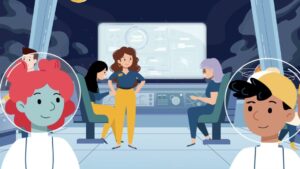When COVID-19 hit last spring, the EPC quickly moved services online, working to meet the needs of our students, their families, and educational partners. Remote services include academic advising, tutoring, workshops, and family support.
A recent report compiled by the EPC’s Research & Evaluation Department, which presents findings from staff, students, and parents on their perceptions of our remote services during the spring, summer, and early fall of 2020, supports what we already suspected: the population we serve are among those most impacted by the pandemic.
Our students and their families are struggling to meet their basic needs, facing increased health risks and tremendous financial difficulties. Student and parent engagement have plummeted as a result of the shift to remote services. According to the report, less than 40% of the staff respondents reported that their students were engaging in the services they provided, and less than 20% reported that parents were engaging with services.
For many students, connecting with EPC staff is more complicated in a remote environment. When they’re attending school in person, students can run into staff informally or they can drop into the college center as time allows. On campus, tutoring is easy to access because the students just have to go to the college center to receive it. Now, they have to schedule a Zoom meeting to work with a tutor. Students’ schedules have also changed; whereas they used to be in school for a set number of hours, they now juggle other responsibilities during the school day.
“It’s a lot harder to provide services the same way as before Covid-19; now that we are sheltering in place, students dedicate more time to doing other work. This includes students having additional online classes when they normally wouldn’t, taking care of family members or other things they need to take care of. This makes it difficult for us to schedule time to work with each other. It also makes it difficult for the students to allocate enough time to our work, leading to slower progress,” reports one EPC staffer. That said, it appears that there is higher engagement when staff members have either already established a connection with the students and their families (before the transition to remote services), or when students receive one-to-one interaction with EPC staff.
The EPC is committed to providing vital college and career services for our students and their families even in this remote environment. We are using the information gathered from this report, and from other sources, to refine and further develop our virtual services. We are creating new strategies to meet our students’ and families’ needs, including working with teachers, counselors, schools, and districts to embed our services into the students’ school day to facilitate their engagement with our services. We’re providing regularly scheduled workshops and training sessions for staff to equip them with as many effective tools and strategies as possible. And we are providing incentives, such as food delivery vouchers and gift cards, to encourage students and families to participate in EPC services.
# # #




